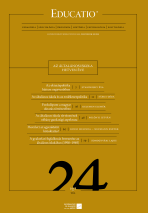Az általános iskola történetének néhány gazdasági aspektusa
Some General Economic Aspects of the History of Schools in Hungary
Author(s): István PolónyiSubject(s): Education, Recent History (1900 till today), School education, History of Education
Published by: Akadémiai Kiadó
Keywords: elementary school; loss of infrastructure development; polarization;
Summary/Abstract: National education standards were not lagging behind 75 years ago when the elementary school system was created. Given the level of economic development, the state socialist system inherited a relatively high level of educational attainment and an advanced school system. Thus, the state leadership has spent very little on improving the school infrastructure, though it has extended the obligations of schools. Domestic, basic education in the early ‘80s was therefore characterized by a polarization that was like that at the end of the ‘30s. The differences between rural, urban and metropolitan education was maintained. Conditions did improve slightly, but the quality of education, despite policy system changes, has not altered. After 1989, the upkeep of schools become decentralized while educational management was liberalized. For this reason, a polarization of the school system and an uneven quality has been conserved to the present day. Polarisation is producing low educational attainment along with employment-related problems; and there are high unemployment and issues with the social cohesion of underprivileged strata of persons. The truth is not that the primary school has gone beyond its time but that time was always moving beyond primary education.
Journal: Educatio
- Issue Year: 24/2015
- Issue No: 4
- Page Range: 48-64
- Page Count: 17
- Language: Hungarian

